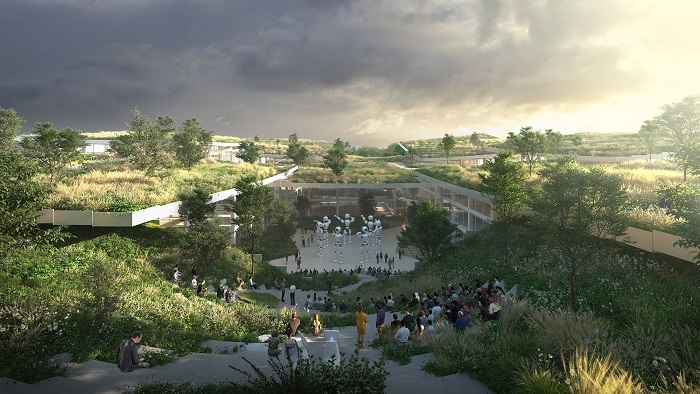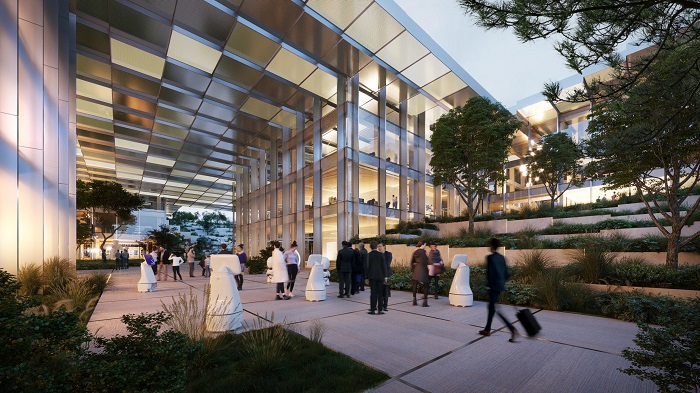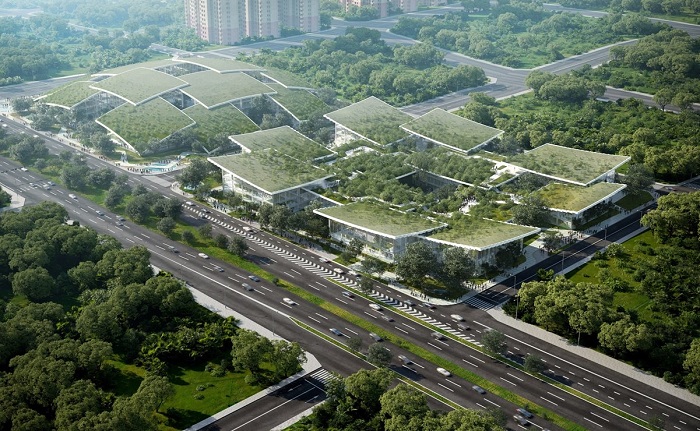ISABEL RUBIO ARROYO | Tungsteno
One in two Europeans would prefer artificial intelligence, not politicians, to make decisions, according to a 2021 study by IE University. This idea, although sounding more like science fiction, might actually not be so far off: Danish architecture firm Bjarke Ingels Group (BIG) and Chinese tech company Terminus are planning to create a smart city development in which artificial intelligence will be entirely in charge.
Technology to manage the city of the future
The aim is to build this campus-style development within Chongqing, a sprawling megacity criss-crossed by rivers and mountains in southwest China. Setting foot in this project, called Cloud Valley, will be like stepping into the future; in this smart city robots deliver coffee, doors open by themselves when they identify residents and office chairs rearrange themselves after meetings. Bjarke Ingels, founding partner of BIG, says Cloud Valley "is envisioned as a city where people, technology and nature thrive together—with spaces designed for all kinds of life: human life, plant life, animal life and even artificial life."
In theory, Cloud Valley will be full of sensors and connected devices that gather all kinds of data, from weather and pollution levels to the eating habits of each resident. The aim of this project is to use robotics, artificial intelligence, big data, 5G and the Internet of Things to anticipate the needs of each person. "It's almost coming back to this idea of living in a village where, when you show up, even though it's the first time you're there, the bar tender knows your favourite drink," says Ingels. In the offices, multiple sensors will monitor parameters such as temperature and humidity in real time to ensure a suitable environment.
This development will supposedly be filled with green spaces with natural light and ventilation, lush roof gardens, solar panels and smart homes. As Terminus explains on its website: "As sunlight hits the houses, bedroom windows adjust their opacity to allow the natural light to wake sleepy residents." And it doesn't end there: "Once the light has filled the room, an AI virtual housekeeper named Titan selects your breakfast, matches your outfit with the weather, and presents a full schedule of your day."
Cloud Valley will abound with green spaces with natural light and ventilation, lush garden rooftops, solar panels and smart homes. Credit: Cities of the future.
The technical, ethical and privacy challenges to be overcome
The development in question is designed to occupy more than one million square metres. Although the size of a large neighbourhood, the dimensions of this urban initiative are colossal, especially considering that it’s a pilot project. On this expanse, equivalent to about 200 football fields (or a third of (or a third of New York's Central Park), hundreds of offices, homes and smart public spaces are planned to be built, as well as infrastructure for autonomous cars. The project was launched in April 2020 and its developers aim to have the city ready in about three years, according to Terminus.
Some of Cloud Valley's proposals do not sound so futuristic; in fact, they have already been rolled out in different parts of the world. For example, there are already robots in restaurants that can serve food, flip burgers and even clean up afterwards. Voice assistants can offer personalised content to the user, report the weather or set routines and reminders. There are also companies that can monitor all kinds of everyday devices: from chairs and doors to tables and windows. The information gathered can be useful, for example, to know the occupancy rate of a space and optimise it.

The project was launched in April 2020 and its developers aim to have the city project ready in about three years. Credit: BIG.
But numerous details about how the AI-controlled city will work and how it will be governed have yet to be made public. The undertaking of such a large-scale initiative raises a number of technical, ethical and privacy challenges. Eva Blum-Dumontet, a senior researcher at the UK-based advocacy group Privacy International, stresses that smart cities risk becoming a threat to human rights if companies and governments do not take steps to limit surveillance and ensure inclusiveness. "We need to ask, for instance, how the city will affect people who may not be tech literate," she told Reuters. There is also a risk that "there is not a legal framework limiting the access that governments can obtain over the data collected by private companies."
In addition, the fact that an artificial intelligence system can make decisions about people’s lives can carry risks, particularly if these relate to the granting of credit, the hiring of individuals or judicial rulings. The data on which algorithms are trained are influenced by prejudices, and minorities are the most susceptible to being affected by these biases, as some research has shown.
Added to all these challenges is how to deal with cybersecurity threats. If any element of this new city is unprotected, the entire structure could become vulnerable to attack or disruption. It would not be the first time that critical infrastructure such as hospitals, offices, roads or other facilities have fallen victim to a cyber-attack. For example, a few months ago, nine out of ten gas stations in Washington D.C. ran out of product after a major oil pipeline was hijacked in the United States.

Operating a smart city raises multiple technical, ethical and privacy challenges. Credit: BIG.
The key to solving the big problems of the century?
It is still too early to tell whether this Chinese urban development governed exclusively by artificial intelligence will actually be ready in three years and how futuristic it will be compared to the claims of its promoters. But there is no doubt that the Cloud Valley project is yet another example of the strong commitment of large nations to incorporate the latest technologies into their regions. Investment in smart city initiatives is growing worldwide and is forecast to increase from $81 billion in 2018 to $189.5 billion in 2023, according to Statista.
In China alone, more than 500 smart cities are being built, according to Reuters news agency, citing data from the Chinese government. By developing these cities, the goal is to solve some major urban problems such as energy shortages, traffic, and environmental pollution. If there is one thing that all the major powers agree on, it is that new technologies are an effective weapon to tackle some of the most ambitious challenges of the 21st century as soon as possible.
· — —
Tungsteno is a journalism laboratory to scan the essence of innovation. Devised by Materia Publicaciones Científicas for Sacyr’s blog.
